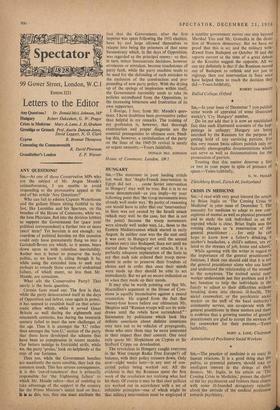HUNGARY
SIR,—The statement in your leading article last week that 'Anglo-French intervention in Egypt did not . . . cause Soviet intervention in Hungary' may well be true. But it is in no sense demonstrated—as you imply—by your following point that 'the troop movements were already well under way.' By parity of reasoning one would have to infer that our 'intervention' in Suez was not caused by the Israeli attack (which may well be the case, but that is not the point) because the troop movements were already well under way, i.e., those to the Eastern Mediterranean which started in early August. In neither case was the die cast until it was cast; in Hungary not until the second Russian entry into Budapest; Suez not until we started those 'softening-up' air attacks. It is a perfectly adequate explanation of the facts to say that each side ordered their troop move- ments in order to preserve their freedom of choice and in order that once their minds were made up they should be able to act immediately. But we get no secure indication as to when they made up their minds.
It may also be worth pointing out that Mr. Macmillan's argument in the House of Com- mons is equally inconclusive against a casual connection. He argued from the fact that 'twenty-four hours before our ultimatum Mr. Shepilov said "Russian troops will not be with- drawn until the rebels have surrendered." ' Statements by politicians which look like definite assertions about definite intentions may turn out to be vehicles of propaganda; those who utter them may be more interested in their impact than their content. One need only quote Mr. Hopkinson on Cyprus or Sir Stafford Cripps on devaluation.
The revolution in Hungary caught everyone in the West (except Radio Free Europe?) off balance, with their policy trousers down. Only now—eight weeks later—is any sort of con- certed policy being worked out. All the evidence is that the Russians spent the first week of the revolution not realising what had hit them. Of course it may be that their policies are worked out in accordance with a set of inflexible principles—one of which might be that military intervention must be employed if a satellite government moves one step beyond Marshal Tito and Mr. Gomulka in the direc- tion of Western democracy. But we have no proof that this is so; and the military with- drawal from Budapest on October 30 and the reports current at the time of a great debate in the Kremlin suggest the opposite. All see can say definitely is that if the Russians moved out of Budapest to rethink and not just to regroup, then our intervention in Suez nmst have helped them to reach the decision they did.—Yours faithfully, ROBERT OAKESHOTT
Balliol College, Oxford


































 Previous page
Previous page